Main Data on Immigration Administration from January to June
Share on wechat
×
Use wechat to "scan" to share the web page with your wechat friends.
On July 30, National Immigration Administration (NIA) held a press conference and released the main data on immigration administration in the first half of 2021.
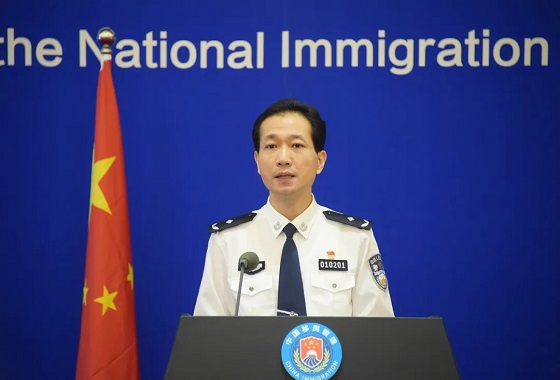
Chen Jie, NIA spokesperson and director general of the Department of Policy and Legal Affairs, hosted the press conference. He briefed the public on the main data and results of immigration administration from January to June 2021, and answered questions from the media. (Photo by Li Yiheng)
From January to June, exit-entry ports across the country checked a total of 66,973,000 passengers, and inspected 7,527,000 vehicles (flights and vessels), including 111,000 cargo flights, representing an annual increase of 189.5 percent and 35 percent compared with the figures in 2019 and 2020 respectively. National immigration authorities across the country processed 1,224,000 entry and exit documents for mainland residents, issued 3,179,000 endorsements for travelers to Hong Kong, Macao and Taiwan, and issued 380,000 stay and residence permits for foreigners in China. National immigration authorities also reported seizures of 85,000 illegal exit-entry travelers, 31,000 foreigners for illegal immigration/residence/employment, 5.63 tons of various narcotics, 352.25 tons of precursor chemicals, and 1,430 firearms of various types.
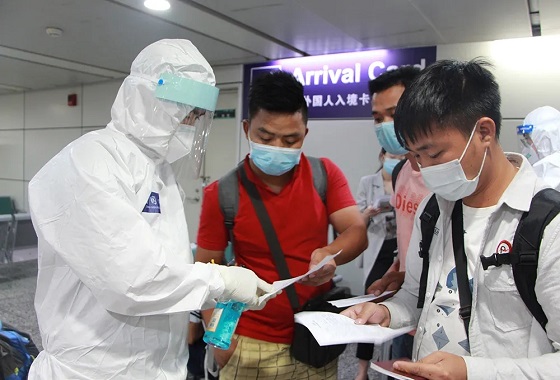
A police officer from Baiyun Frontier Inspection Station of Guangzhou General Station of Exit-entry Frontier Inspection assists incoming passengers in reporting their personal health for epidemic control. (Photo by Chen Junquan)

Police officers from Khorgos Frontier Inspection Station of Xinjiang General Station of Exit-entry Frontier Inspection check a China-Europe Railway Express train. (Photo by Zha Rui)
As the fight against COVID-19 intensified and measures to control imported cases tightened in the first half of this year, NIA has always put efforts to prevent inbound transmission as the top priority. It made dynamic adjustments to immigration policies in response to the epidemic development, adhered to the no-exit policy under non-emergent or non-essential circumstances, and tightened examination and issuance of entry and exit documents for mainland residents. A total of 335,000 ordinary passports were issued in the first six months nationwide, mainly for overseas study, employment and business purposes, while the number of issuance was only 2 percent of the same period in 2019. Port visas and visa-free entry and transit policies for incoming travelers from medium-risk and high-risk overseas areas were suspended.
NIA strictly executed the policy to allow cargo conveyance while tightening restrictions on human mobility, conducted screening and release of inbound cargo flights at designated areas, and restricted personnel from embarking on and crew members from disembarking from inbound and outbound vessels,and restricted these vessels from berthing alongside other vessels under non-essential circumstances for epidemic control. NIA strengthened joint efforts with local governments and departments to further epidemic responses, optimized early warning services using big data analysis, informed the customs, public health authorities and local joint prevention and control mechanism teams in a timely manner about information of personnel from high-risk areas, and facilitated national epidemic response with screening of 4,586 confirmed and suspected cases as well as 343,000 close contacts. NIA strengthened and consolidated epidemic response at the borders and on the frontline, established strong epidemic response systems at the borders, set up police service spots, public security duty points, and second-line checkpoints along the frontline, facilitated the creation of organizations for joint prevention, fully implemented measures for border management, and intercepted illegal migration and trafficking across the borders.
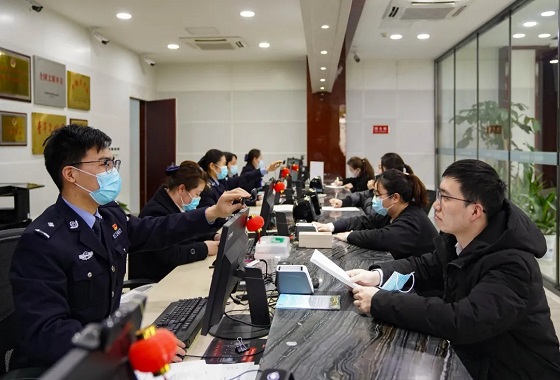
Police officers from the Exit-entry Administration Detachment of Nanjing Public Security Bureau issue exit and entry documents for residents. (Photo by Chen Yiyi)
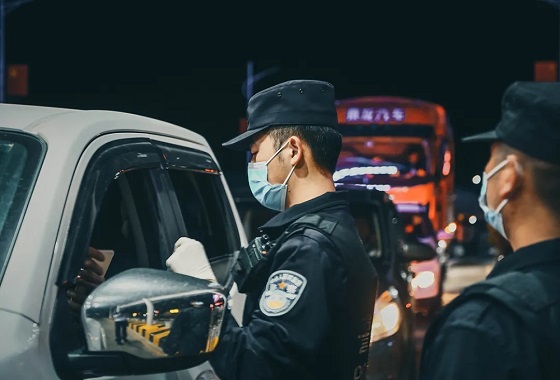
Nighttime inspection is performed by police officers from the Yiwu Frontier Inspection Station under Xishuangbanna Frontier Administration Detachment, Yunnan Province. (Photo by Li Ximei)
NIA always makes the maintenance of political security its top priority, and strictly prevents and severely combats the infiltration and sabotage activities of hostile forces inside and outside the country. With rigorous frontline inspections along the borders, strict border management and control, and improved criminal investigation, immigration administration authorities at all levels have severely cracked down on criminal activities of various types. In the first half of this year, a total of 8,419 criminal cases of obstructing national border administration were established nationwide, and more than 21,000 suspects were arrested, up by 220 percent and 271 percent respectively year-on-year. 578 drug cases were cracked, 40 drug abuse and trafficking dens were destroyed, and a large number of smuggling cases were cracked, all of which have actively contributed to the protection of the lives and property of the people, the maintenance of the national security and the stability at borders and ports.
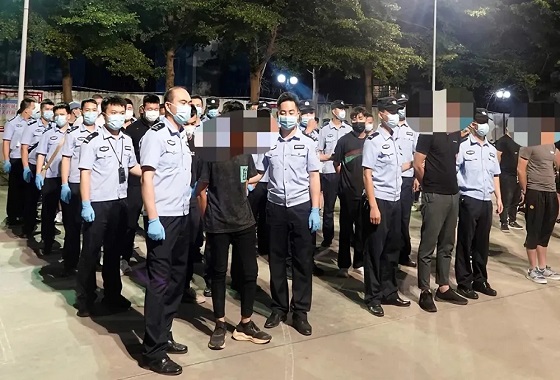
Large-scale organized human smuggling is cracked down with 78 people arrested in Guangxi Province.
NIA furthered reforms to streamline administration and delegate power, improve regulation, and upgrade services, and took proactive measures to facilitate the creation of a new development pattern and provide practical services and solutions for the public and businesses. It introduced 16 policies and measures to spur the development of shipping enterprises, promoted facilitation measures in ten aspects initially rolled out for the shipping hub building of Yangtze River Delta region to sea ports nationwide, and initiated the border inspection model featuring "cooperative inspection and release after one check" at land ports in Guangdong, Hong Kong and Macao. It also introduced six measures to facilitate the elderly to apply for exit-entry documents and provided a "green channel" for senior applicants without the need for online pre-application. NIA further cuts back on fees for the benefit of the people by cancelling the fees for adding notes on ordinary passports and providing free-of-charge service to apply for exit-entry documents for three groups of people including fishery workers from the mainland working on fishing vessels from Hong Kong and Macao, small-scale traders from Zhuhai and Macao, and cross-border cultivators from Shenzhen. Efforts have been stepped up to promote easy applications for exit-entry documents, and provide smart and convenient administrative services. The China Immigration Service Hotline has been launched to offer 24/7 Chinese and English bilingual consulting services regarding immigration administration policies for Chinese and foreigners, with up to 99.5 percent of problems resolved in the first call, effectively improving the sense of happiness and gains of the people.
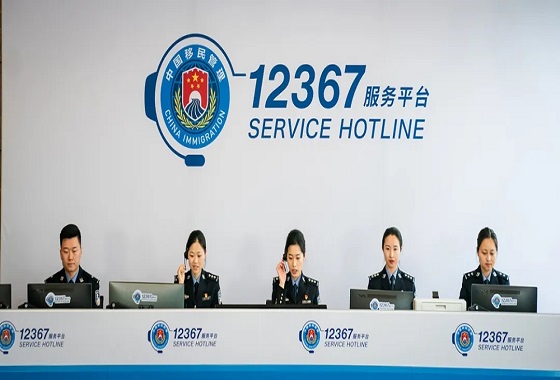
Police officers provide consultation services regarding immigration administration policies for Chinese and foreigners via the China Immigration Service Hotline. (Photo by Dong Quanhui)
NIA spokesperson Chen Jie said that in the second half of this year, NIA will make dynamic adjustments to the immigration and exit-entry administration policies according to the needs of epidemic prevention and control. While working hard to prevent the inflow of coronavirus, NIA will focus on providing services and solving problems for market entities and the public in a practical manner, continue to deepen immigration administration reforms to streamline administration, delegate power, and improve services, take proactive measures to facilitate high-level opening up and high-quality development, maintain the security and stability of the national border with all efforts, and resolutely defend national sovereignty, security and development interests of the country.
Notice: The English version is only for reference. To learn more, please refer to the authoritative Chinese version.


